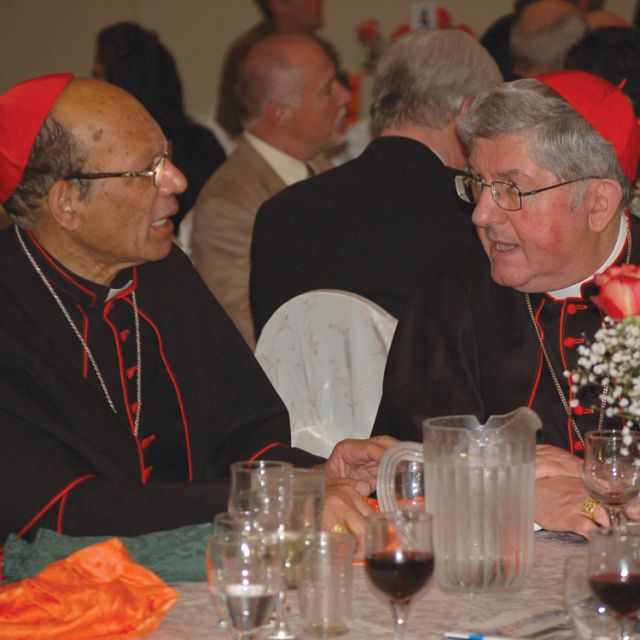Following a traditional Indian dinner surrounded by 170 guests and a warm welcome from friend Cardinal Thomas Collins, Gracias detailed the advances of the Indian Church despite a slew of challenges.
First and foremost, he cited contributions to education, particularly in rural areas where 60 per cent of India’s Catholic schools are established.
“We noticed in India a great interest in our people to learn the Bible,” said Gracias. Currently the school systems operated by the Church educate about seven million students, more then half of whom are female who otherwise would never attend school. Aside from spreading the word of God, students are also taught reading, arithmetic and rights.
“But in a country still stricken by outbursts of radical fundamentalism, anything progressive for the otherwise marginalized can be dangerous. There is a certain amount of fundamentalism in our country,” he added, citing the murders of several church officials for expressing ideas of social equality.
“Another problem we have is unfriendly legislation. . . laws which interfere with our day-to-day function. There are anti-conversion bills in some parts of the country,” Gracias said.
These laws place restrictions on people who may wish to change religions, a desire which often arises from Christian education said Gracias. To convert, a person must receive permission from local police, the government and a religious figure. The issue is particularly acute in rural areas.
“The rural areas are really under served,” in both education and healthcare said Gracias. “The cities are getting better facilities but the rural areas are not.”
In addition to education, the Church has taken on responsibility for 524 medical facilities, with the vast majority of them located far beyond city limits. This begins to highlight the third component of the Church’s contribution, development, which is provided regardless of faith.
“The Church’s work in development has been significant as well. We have tried to focus on relief,” said Gracias, adding that relief means more than handing out supplies in the wake of a disaster.
To date, 22,500 projects, costing about $300 million, have been undertaken by the Church to provide sustainable development and not just temporary shelter.
“We’ve made a change of focus from just giving relief,” said Gracias. “The Church is small but very active.”
The Catholic Church plays catch up in Indian society
By Evan Boudreau, The Catholic RegisterMISSISSAUGA - Despite representing just 2.3 per cent of the nation’s billion-plus population, India’s Christians are making an impact in the rapidly developing nation.
That was the message delivered by Cardinal Oswald Gracias as the Archbishop of Bombay concluded a Canadian tour at a March 19 banquet.
“We are breaking out from the Christian community to human communities,” said Gracias.
Please support The Catholic Register
Unlike many media companies, The Catholic Register has never charged readers for access to the news and information on our website. We want to keep our award-winning journalism as widely available as possible. But we need your help.
For more than 125 years, The Register has been a trusted source of faith-based journalism. By making even a small donation you help ensure our future as an important voice in the Catholic Church. If you support the mission of Catholic journalism, please donate today. Thank you.
DONATE

